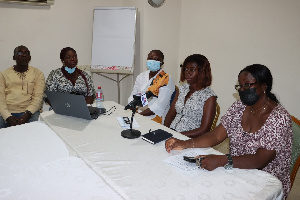- Home - News
- Polls
- Year In Review
- News Archive
- Crime & Punishment
- Politics
- Regional
- Editorial
- Health
- Ghanaians Abroad
- Tabloid
- Africa
- Religion
- Election 2020
- Coronavirus
- Photo Archives
- News Headlines
- Press Release
General News of Wednesday, 22 December 2021
Source: Obrempong Yaw Ampofo, Contributor
Women in mining seek 30% allocation of viable mining concessions
The Artisanal Small-Scale Women in Mining (ASWiM), the women's wing of the Ghana National Association of Small-Scale Miners, has called for at least 30 per cent allocation of viable mining concessions to women in mining.
This call, according to the National Coordinator of ASWiM Mrs. Victoria Guerrieri is in tandem with the African Mining Vision that called for the integration of gender equality in mining policies, laws, regulations, standards and codes.
Currently, female mining concessionaires account for some 10 percent in Ghana, even though there are several thousands of women in the sector but serve as source of labour and other menial services.
At a press briefing held in Accra with support from Friends of the Nation, Oxfam in Ghana and the Ford Foundation, Mrs. Guerrieri stated that empowering women to go beyond serving as labour and other menial jobs, to becoming owners of mine concessions has the potential to curb poverty.
She said “often, the Minerals Commission will announce a block-out area. Because mining is seen as male job, the block-out area will all end up with the men. But we are appealing to the Ministry of Lands and Natural Resources and the Minerals Commission to make provisions to set aside between 20 and 30 percent of block-out areas for women. Such initiative will increase the number of female concessionaires in Ghana, and empower more women into mining. This when considered can help alleviate poverty in many households”.
The Artisanal Small-Scale Women in Mining, with about 5,000 members across the 10 mining districts, was formed last year to champion the interest of women in the artisanal small-scale mining sector and empower women, especially the vulnerable women on the mine sites to be financially independent.
Mrs. Guerrieri also appealed to the Ministry of Lands and Natural Resources (MLNR) and the Agricultural Development Bank Bank (ADB) to also set aside a percentage of a proposed loan facility for artisanal small-scale miners for women miners.
She also called on Ghana’s development partners to offer the support that will help ASWiM to undertake training programs on mercury handling, health and safety, site management, financial management, leadership and training for alternative livelihood for women in mining in Ghana.
Entertainment










